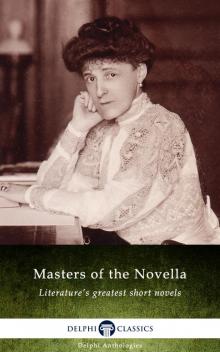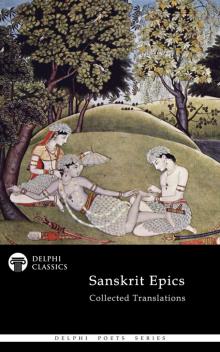- Home
- Delphi Classics
Masters of the Theatre Page 5
Masters of the Theatre Read online
Page 5
MESSENGER
Those ankle joints are evidence enow.
OEDIPUS
Ah, why remind me of that ancient sore?
MESSENGER
I loosed the pin that riveted thy feet.
OEDIPUS
Yes, from my cradle that dread brand I bore.
MESSENGER
Whence thou deriv’st the name that still is thine.
OEDIPUS
Who did it? I adjure thee, tell me who
Say, was it father, mother?
MESSENGER
I know not.
The man from whom I had thee may know more.
OEDIPUS
What, did another find me, not thyself?
MESSENGER
Not I; another shepherd gave thee me.
OEDIPUS
Who was he? Would’st thou know again the man?
MESSENGER
He passed indeed for one of Laius’ house.
OEDIPUS
The king who ruled the country long ago?
MESSENGER
The same: he was a herdsman of the king.
OEDIPUS
And is he living still for me to see him?
MESSENGER
His fellow-countrymen should best know that.
OEDIPUS
Doth any bystander among you know
The herd he speaks of, or by seeing him
Afield or in the city? answer straight!
The hour hath come to clear this business up.
CHORUS
Methinks he means none other than the hind
Whom thou anon wert fain to see; but that
Our queen Jocasta best of all could tell.
OEDIPUS
Madam, dost know the man we sent to fetch?
Is the same of whom the stranger speaks?
JOCASTA
Who is the man? What matter? Let it be.
‘Twere waste of thought to weigh such idle words.
OEDIPUS
No, with such guiding clues I cannot fail
To bring to light the secret of my birth.
JOCASTA
Oh, as thou carest for thy life, give o’er
This quest. Enough the anguish I endure.
OEDIPUS
Be of good cheer; though I be proved the son
Of a bondwoman, aye, through three descents
Triply a slave, thy honor is unsmirched.
JOCASTA
Yet humor me, I pray thee; do not this.
OEDIPUS
I cannot; I must probe this matter home.
JOCASTA
’Tis for thy sake I advise thee for the best.
OEDIPUS
I grow impatient of this best advice.
JOCASTA
Ah mayst thou ne’er discover who thou art!
OEDIPUS
Go, fetch me here the herd, and leave yon woman
To glory in her pride of ancestry.
JOCASTA
O woe is thee, poor wretch! With that last word
I leave thee, henceforth silent evermore.
[Exit JOCASTA]
CHORUS
Why, Oedipus, why stung with passionate grief
Hath the queen thus departed? Much I fear
From this dead calm will burst a storm of woes.
OEDIPUS
Let the storm burst, my fixed resolve still holds,
To learn my lineage, be it ne’er so low.
It may be she with all a woman’s pride
Thinks scorn of my base parentage. But I
Who rank myself as Fortune’s favorite child,
The giver of good gifts, shall not be shamed.
She is my mother and the changing moons
My brethren, and with them I wax and wane.
Thus sprung why should I fear to trace my birth?
Nothing can make me other than I am.
CHORUS
(Str.)
If my soul prophetic err not, if my wisdom aught avail,
Thee, Cithaeron, I shall hail,
As the nurse and foster-mother of our Oedipus shall greet
Ere tomorrow’s full moon rises, and exalt thee as is meet.
Dance and song shall hymn thy praises, lover of our royal race.
Phoebus, may my words find grace!
(Ant.)
Child, who bare thee, nymph or goddess? sure thy sure was more than
man,
Haply the hill-roamer Pan.
Of did Loxias beget thee, for he haunts the upland wold;
Or Cyllene’s lord, or Bacchus, dweller on the hilltops cold?
Did some Heliconian Oread give him thee, a new-born joy?
Nymphs with whom he love to toy?
OEDIPUS
Elders, if I, who never yet before
Have met the man, may make a guess, methinks
I see the herdsman who we long have sought;
His time-worn aspect matches with the years
Of yonder aged messenger; besides
I seem to recognize the men who bring him
As servants of my own. But you, perchance,
Having in past days known or seen the herd,
May better by sure knowledge my surmise.
CHORUS
I recognize him; one of Laius’ house;
A simple hind, but true as any man.
[Enter HERDSMAN.]
OEDIPUS
Corinthian, stranger, I address thee first,
Is this the man thou meanest!
MESSENGER
This is he.
OEDIPUS
And now old man, look up and answer all
I ask thee. Wast thou once of Laius’ house?
HERDSMAN
I was, a thrall, not purchased but home-bred.
OEDIPUS
What was thy business? how wast thou employed?
HERDSMAN
The best part of my life I tended sheep.
OEDIPUS
What were the pastures thou didst most frequent?
HERDSMAN
Cithaeron and the neighboring alps.
OEDIPUS
Then there
Thou must have known yon man, at least by fame?
HERDSMAN
Yon man? in what way? what man dost thou mean?
OEDIPUS
The man here, having met him in past times...
HERDSMAN
Off-hand I cannot call him well to mind.
MESSENGER
No wonder, master. But I will revive
His blunted memories. Sure he can recall
What time together both we drove our flocks,
He two, I one, on the Cithaeron range,
For three long summers; I his mate from spring
Till rose Arcturus; then in winter time
I led mine home, he his to Laius’ folds.
Did these things happen as I say, or no?
HERDSMAN
’Tis long ago, but all thou say’st is true.
MESSENGER
Well, thou mast then remember giving me
A child to rear as my own foster-son?
HERDSMAN
Why dost thou ask this question? What of that?
MESSENGER
Friend, he that stands before thee was that child.
HERDSMAN
A plague upon thee! Hold thy wanton tongue!
OEDIPUS
Softly, old man, rebuke him not; thy words
Are more deserving chastisement than his.
HERDSMAN
O best of masters, what is my offense?
OEDIPUS
Not answering what he asks about the child.
HERDSMAN
He speaks at random, babbles like a fool.
OEDIPUS
If thou lack’st grace to speak, I’ll loose thy tongue.
HERDSMAN
For mercy’s sake abuse not an old man.
OEDIPUS
Arrest the villain, seize and pinion him!
HERDSMAN
Alack, alack!
What have I done? what wouldst thou further learn?
OEDIPUS
Didst give this man the child of whom he asks?
HERDSMAN
I did; and would that I had died that day!
OEDIPUS
And die thou shalt unless thou tell the truth.
HERDSMAN
But, if I tell it, I am doubly lost.
OEDIPUS
The knave methinks will still prevaricate.
HERDSMAN
Nay, I confessed I gave it long ago.
OEDIPUS
Whence came it? was it thine, or given to thee?
HERDSMAN
I had it from another, ’twas not mine.
OEDIPUS
From whom of these our townsmen, and what house?
HERDSMAN
Forbear for God’s sake, master, ask no more.
OEDIPUS
If I must question thee again, thou’rt lost.
HERDSMAN
Well then — it was a child of Laius’ house.
OEDIPUS
Slave-born or one of Laius’ own race?
HERDSMAN
Ah me!
I stand upon the perilous edge of speech.
OEDIPUS
And I of hearing, but I still must hear.
HERDSMAN
Know then the child was by repute his own,
But she within, thy consort best could tell.
OEDIPUS
What! she, she gave it thee?
HERDSMAN
’Tis so, my king.
OEDIPUS
With what intent?
HERDSMAN
To make away with it.
OEDIPUS
What, she its mother.
HERDSMAN
Fearing a dread weird.
OEDIPUS
What weird?
HERDSMAN
’Twas told that he should slay his sire.
OEDIPUS
What didst thou give it then to this old man?
HERDSMAN
Through pity, master, for the babe. I thought
He’d take it to the country whence he came;
But he preserved it for the worst of woes.
For if thou art in sooth what this man saith,
God pity thee! thou wast to misery born.
OEDIPUS
Ah me! ah me! all brought to pass, all true!
O light, may I behold thee nevermore!
I stand a wretch, in birth, in wedlock cursed,
A parricide, incestuously, triply cursed!
[Exit OEDIPUS]
CHORUS
(Str. 1)
Races of mortal man
Whose life is but a span,
I count ye but the shadow of a shade!
For he who most doth know
Of bliss, hath but the show;
A moment, and the visions pale and fade.
Thy fall, O Oedipus, thy piteous fall
Warns me none born of women blest to call.
(Ant. 1)
For he of marksmen best,
O Zeus, outshot the rest,
And won the prize supreme of wealth and power.
By him the vulture maid
Was quelled, her witchery laid;
He rose our savior and the land’s strong tower.
We hailed thee king and from that day adored
Of mighty Thebes the universal lord.
(Str. 2)
O heavy hand of fate!
Who now more desolate,
Whose tale more sad than thine, whose lot more dire?
O Oedipus, discrowned head,
Thy cradle was thy marriage bed;
One harborage sufficed for son and sire.
How could the soil thy father eared so long
Endure to bear in silence such a wrong?
(Ant. 2)
All-seeing Time hath caught
Guilt, and to justice brought
The son and sire commingled in one bed.
O child of Laius’ ill-starred race
Would I had ne’er beheld thy face;
I raise for thee a dirge as o’er the dead.
Yet, sooth to say, through thee I drew new breath,
And now through thee I feel a second death.
[Enter SECOND MESSENGER.]
SECOND MESSENGER
Most grave and reverend senators of Thebes,
What Deeds ye soon must hear, what sights behold
How will ye mourn, if, true-born patriots,
Ye reverence still the race of Labdacus!
Not Ister nor all Phasis’ flood, I ween,
Could wash away the blood-stains from this house,
The ills it shrouds or soon will bring to light,
Ills wrought of malice, not unwittingly.
The worst to bear are self-inflicted wounds.
CHORUS
Grievous enough for all our tears and groans
Our past calamities; what canst thou add?
SECOND MESSENGER
My tale is quickly told and quickly heard.
Our sovereign lady queen Jocasta’s dead.
CHORUS
Alas, poor queen! how came she by her death?
SECOND MESSENGER
By her own hand. And all the horror of it,
Not having seen, yet cannot comprehend.
Nathless, as far as my poor memory serves,
I will relate the unhappy lady’s woe.
When in her frenzy she had passed inside
The vestibule, she hurried straight to win
The bridal-chamber, clutching at her hair
With both her hands, and, once within the room,
She shut the doors behind her with a crash.
“Laius,” she cried, and called her husband dead
Long, long ago; her thought was of that child
By him begot, the son by whom the sire
Was murdered and the mother left to breed
With her own seed, a monstrous progeny.
Then she bewailed the marriage bed whereon
Poor wretch, she had conceived a double brood,
Husband by husband, children by her child.
What happened after that I cannot tell,
Nor how the end befell, for with a shriek
Burst on us Oedipus; all eyes were fixed
On Oedipus, as up and down he strode,
Nor could we mark her agony to the end.
For stalking to and fro “A sword!” he cried,
“Where is the wife, no wife, the teeming womb
That bore a double harvest, me and mine?”
And in his frenzy some supernal power
(No mortal, surely, none of us who watched him)
Guided his footsteps; with a terrible shriek,
As though one beckoned him, he crashed against
The folding doors, and from their staples forced
The wrenched bolts and hurled himself within.
Then we beheld the woman hanging there,
A running noose entwined about her neck.
But when he saw her, with a maddened roar
He loosed the cord; and when her wretched corpse
Lay stretched on earth, what followed — O ’twas dread!
He tore the golden brooches that upheld
Her queenly robes, upraised them high and smote
Full on his eye-balls, uttering words like these:
“No more shall ye behold such sights of woe,
Deeds I have suffered and myself have wrought;
Henceforward quenched in darkness shall ye see
Those ye should ne’er have seen; now blind to those
Whom, when I saw, I vainly yearned to know.”
Such was the burden of his moan, whereto,
Not once but oft, he struck with his hand uplift
His eyes, and at each stroke the ensanguined orbs
Bedewed his beard, not oozing drop by dr
op,
But one black gory downpour, thick as hail.
Such evils, issuing from the double source,
Have whelmed them both, confounding man and wife.
Till now the storied fortune of this house
Was fortunate indeed; but from this day
Woe, lamentation, ruin, death, disgrace,
All ills that can be named, all, all are theirs.
CHORUS
But hath he still no respite from his pain?
SECOND MESSENGER
He cries, “Unbar the doors and let all Thebes
Behold the slayer of his sire, his mother’s—”
That shameful word my lips may not repeat.
He vows to fly self-banished from the land,
Nor stay to bring upon his house the curse
Himself had uttered; but he has no strength
Nor one to guide him, and his torture’s more
Than man can suffer, as yourselves will see.
For lo, the palace portals are unbarred,
And soon ye shall behold a sight so sad
That he who must abhorred would pity it.
[Enter OEDIPUS blinded.]
CHORUS
Woeful sight! more woeful none
These sad eyes have looked upon.
Whence this madness? None can tell
Who did cast on thee his spell,
prowling all thy life around,
Leaping with a demon bound.
Hapless wretch! how can I brook
On thy misery to look?
Though to gaze on thee I yearn,
Much to question, much to learn,
Horror-struck away I turn.
OEDIPUS
Ah me! ah woe is me!
Ah whither am I borne!
How like a ghost forlorn
My voice flits from me on the air!
On, on the demon goads. The end, ah where?
CHORUS
An end too dread to tell, too dark to see.
OEDIPUS
(Str. 1)
Dark, dark! The horror of darkness, like a shroud,
Wraps me and bears me on through mist and cloud.
Ah me, ah me! What spasms athwart me shoot,
What pangs of agonizing memory?
CHORUS
No marvel if in such a plight thou feel’st
The double weight of past and present woes.
OEDIPUS
(Ant. 1)
Ah friend, still loyal, constant still and kind,
Thou carest for the blind.
I know thee near, and though bereft of eyes,
Thy voice I recognize.
CHORUS
O doer of dread deeds, how couldst thou mar
Thy vision thus? What demon goaded thee?
OEDIPUS
(Str. 2)
Apollo, friend, Apollo, he it was
That brought these ills to pass;
But the right hand that dealt the blow
Was mine, none other. How,
How, could I longer see when sight
Brought no delight?
CHORUS
Alas! ’tis as thou sayest.
OEDIPUS
Say, friends, can any look or voice
Or touch of love henceforth my heart rejoice?

 Masters of the Theatre
Masters of the Theatre Masters of the Novella
Masters of the Novella The Sanskrit Epics
The Sanskrit Epics